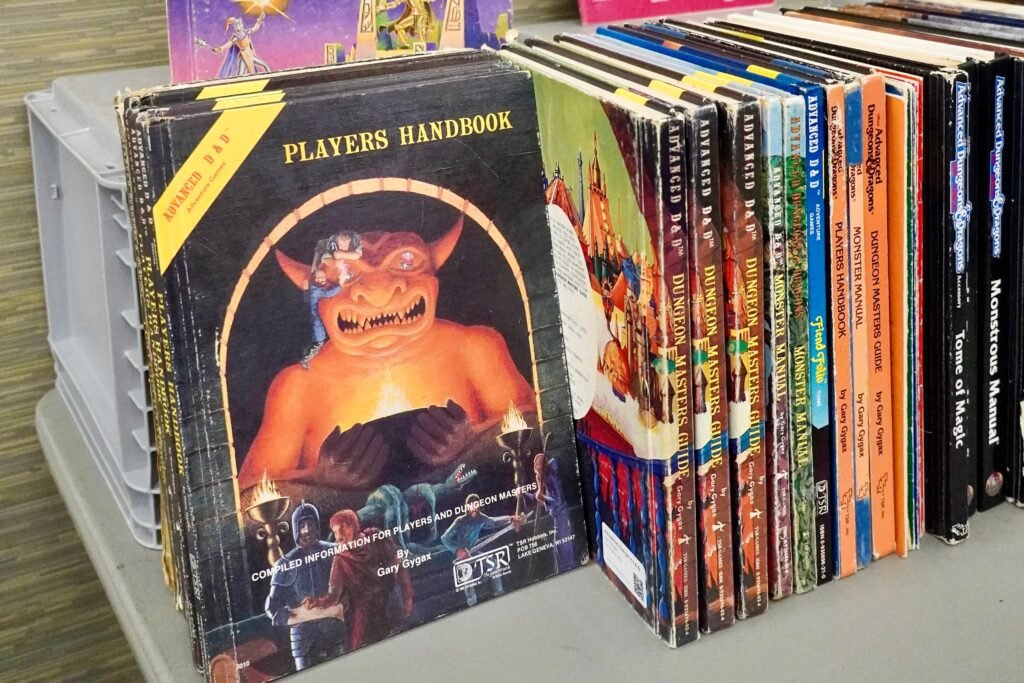
Game preservation is a hot button topic today. For instance, I want nothing more than to play the original Silent Hill games. However, that would require me to first track down consoles I don’t already own, that stopped being manufactured decades ago. Then, I would have to find secondhand copies of all the games without bankrupting myself. About a year ago, I saw a copy of Silent Hill 3 being sold for $300 at a game shop – used, of course.
A similar problem exists for tabletop games, but it’s one that the Alexandria RPG Library is directly addressing. They’re a nonprofit group that operates as a lending library at conventions across the country. The Alexandria RPG Library has a massive collection of TTRPG books from the earliest days of Dungeons and Dragons and Call of Cthulhu, all the way to the present. Unlike video games, tabletop games benefit from the fact that the medium in which we access their information – our eyes, ears, etc. – hasn’t changed since the games were originally created. As long as a book hasn’t crumbled to dust, it can be read.
When I strolled the Alexandria RPG Library collection at PAX East 2025, I felt like I was walking through history (which seems to be a recurring theme for me at this convention). Next to early editions of Call of Cthulhu were more recent texts like Darker Hue Studios’ excellent Harlem Unbound supplement. There was something for everyone there. Case in point: I found a book for a game based on Sam Raimi’s Army of Darkness film. The ingenuity of nerds!
I was immediately pulled to the original sourcebook from the very first Star Wars TTRPG from West End Games, a book I’ve never seen in person. One of the first pieces I ever wrote for Popverse was about how that sourcebook introduced core elements in the Star Wars universe, like the language Basic. Holding it in my hands sent me into state of barely controlled giddiness, like I was Nicolas Cage unfurling the Declaration of Independence in National Treasure. I didn’t steal it of course. As a former library assistant, I believe in preservation and access to information for all.
Walking over to the oldest editions of Dungeons and Dragons, I realized that these must have been the books that my brother played with back in the 1980s, like the kids on Stranger Things. While I understood that my older brother and I come from two different gaming generations (I beat him at Mario Kart when I was 10 and he was grown, and I saw him have an existential crisis in real time), that fact took on new life through the physical objects I was holding in my hands for the first time. I wasn’t around for my brother’s youth, but flipping through the first edition of Dungeons and Dragons provided a window into that time period that I had never considered looking through before.
Maybe this is just the archaeology classes I took in college talking through me, but there’s something to be said for approaching game materials as artifacts. My professor in college impressed upon me that most of the time, archaeology is the study of dead people’s trash. But sometimes, you uncover an artifact that isn’t just trash, it’s something more than that. Games aren’t garbage (okay maybe Call of Duty is, but even so there’s a lot to be mined about the military industrial complex there) – they’re activities we invest hours and hours of our lives into. They’re shaped by our worldview. The Alexandria RPG Library opened my eyes to this, and I hope you can swing by them at a convention sometime, because it was a truly special experience.
